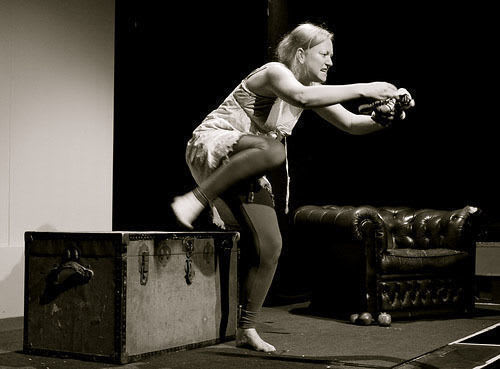Lucia Cox's self-penned one-woman piece Blackbird, that attracted some rave reviews when it appeared at Studio Salford last year, is one of the plays revived by the Library Theatre's Re:Play Festival at The Lowry this year.
Cox plays a girl trapped in a basement room where she has been held for years after being kidnapped as a child. Her relationship with her captor is ambiguous—the programme, obviously designed for younger eyes than mine with its squashed typeface, refers to Stockholm Syndrome in which a captive begins to empathise with her or his captors—as there are suggestions of violence but also expressions of love towards him.
But then pretty much everything in the story is ambiguous as Cox cleverly manipulates the audiences perceptions throughout the play. We seem to be in the American south, but then suddenly we appear not to be. She tells her own life story and acts out elements from it, and also tells the life story of her gaoler performing it as him and acts out elements of that too. The structure of the piece is complex and the language is literary, but it never feels like a creative writing exercise. If we are confused, it is deliberate and there is another surprise around the corner.
While the Library's ideals behind Re:Play are commendable, sometimes the move from a room above a pub to a bigger stage exposes the flaws in a production, but Blackbird looks perfectly at home on the Lowry Studio stage. What does detract a little is the Studio's split auditorium; the front section of seating next to the stage was full on opening night, but I was on the sparsely-populated raised seating further back which felt cut off from the action and broke down the intimacy and therefore the power of the production.
However Cox's performance does reach the back of the auditorium, and an impressive performance it is too. She is perfectly believable as someone whose only experience of the outside world for the past few years has been through what she is told by her captor and the films that she quotes from and reenacts. She puts across her stories, reenactments of stories, stories told by others and reenactments of stories told by others in a perfectly natural way in this energetic performance.
The set is simple but effective and is littered with pomegranates in various states of decay—if, like me, you were wondering whether there is a metaphor here linked with pomegranates being the food of the dead in Greek mythology, the mention of the River Styx later on should put your mind at rest. There are one or two minor directorial affections but generally the production is slick and imaginative. The original director was Sarah Meadows who has also directed The Crypt Project running at the same time in Re:Play, and so James Foster has taken the director's reigns for this restaging. It has also been extended to an hour in length.
This is a very limited run of a piece that has just been nominated for a Manchester Theatre Award under the Best of the Fringe category and is well worth catching while you have the chance, although I suspect we will be seeing more of Cox after this impressive debut.
